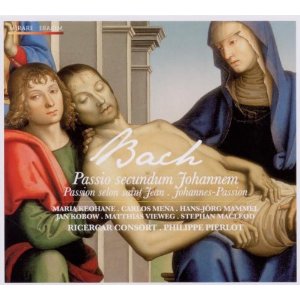|
You are reading the older HTML site
Positive Feedback ISSUE 64
Bach - St. John Passion
Maria Keohane, Helena Ek, sopranos; Carlos Mena, Jan Börner, countertenors; Hans-Jörg Mammel, tenor (Evangelist); Jan Kobow, tenor; Matthias Vieweg, bass (Jesus); Stephan MacLeod, bass; Ricercar Consort/Philippe Pierlot. Mirare MIR 136 (2 CDs). TT: 1:53:28. Consensus and tradition hold the St.John the lesser of Bach's big Passion settings—perhaps the Gospel writer's polemical tone inhibited the composer's inspiration. The present performance, while well-prepared and effective on its own terms, will pose for some listeners a further obstacle in its rigorous "period" performance scale, with starkly reduced forces. The opening number is a fair representation. From the sound, and the photographs, I suspect that the Ricercar Consort's chamber-sized chorus may well comprise just the eight billed soloists, two of whom are not otherwise assigned particular roles or numbers. Traditionalists will miss the tonal weight—and the impersonal, paradoxically universalizing effect—of a larger group. (It's a small crowd indeed in the turba choruses.) On the other hand, the small ensemble allows Philippe Pierlot to evoke the requisite turbulence while keeping the textures clear—the cries of "Herr" cut through as personal pleas—and, in the "B" section, to set off the simpler verbal motifs against the ongoing, semi-detached melismas. Pierlot consistently turns the lightweight sound to advantage in the chorales, emphasizing the intensity of the chromatics in Christus, der uns selig macht, and making more musical sense of Ach grosser König than most. (A bloodless soprano blend, however, leaves several Part Two chorales balanced unhelpfully towards the altos.) In the aria Eilt, ihr angefochtnen Seelen, the choral interjections complement the bass solo without drawing focus. Elsewhere, the director displays an excellent feel for mood and pacing, evoking a devotional tone without squareness, timing the pauses between numbers and sections to further the dramatic flow. The easy, methodical laying out of the textures in Ruht wohl makes it a lovely meditation on the preceding events, though the underemphatic final cadence of the piece, two numbers later, becomes a comparative letdown. Among the soloists, Stephan MacLeod and Maria Keohane take the vocal honors. MacLeod's lyric-baritone timbre and liquid legato are beautiful in Mein teurer Heiland in Part Two; the low melismas are a bit careful, but the voice gains luster as it ascends. He brings intensity and impulse to his Part I solos, as needed. (He's also a gruff Petrus and a constrained Pilate.) Keohane's shiny soprano moves easily in and out of a floaty top, and she phrases affectingly. Carlos Mena sings the alto arias in a clear, unaffected countertenor, with the tone reasonably full and round as recorded. The low range, predictably, is weaker than the rest of the voice; on the other hand, his rhythmic address in the faster sections of Es ist vollbracht is lively. Hans-Jörg Mammel's first few notes as the Evangelist sound so heady as to suggest another countertenor. The tone acquires more bite and body as it descends into the midrange, but the register shifts and flips remain distracting through Part I. In Part II, Mammel's voice sounds more of a piece, and one can appreciate his narrative immediacy and variety, though the flourish on "geisselte" ("scourged") sounds unduly jolly. He also takes the aria Ach, mein Sinn, with heartfelt but pressed tone. Matthias Vieweg sings Jesus in a clear baritone, evoking the music's balance of urgency and serenity. Jan Kobow's whitish tenor disappoints—even when he allows a sustained tone to vibrate, he doesn't follow through to complete the phrase. The various instrumental obbligatos come off well enough, save for Pierlot's own gamba solos: that in Himmel reisse is energetic, but the notes don't all speak dead center, while the one in Es ist vollbracht is awkwardly phrased. The reproduction offers a modicum of ambient atmosphere, and the packaging is efficient. It's your choice. Stephen Francis Vasta is a New York-based conductor, coach, and journalist.
|

